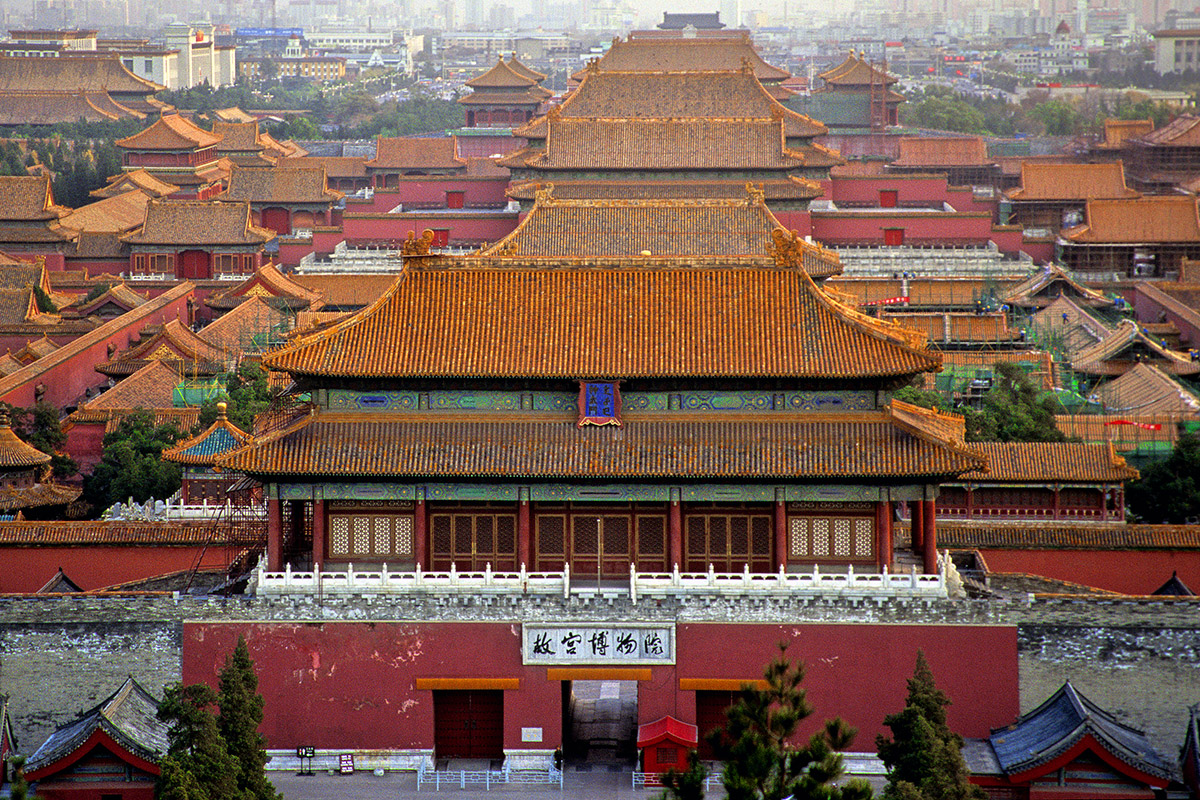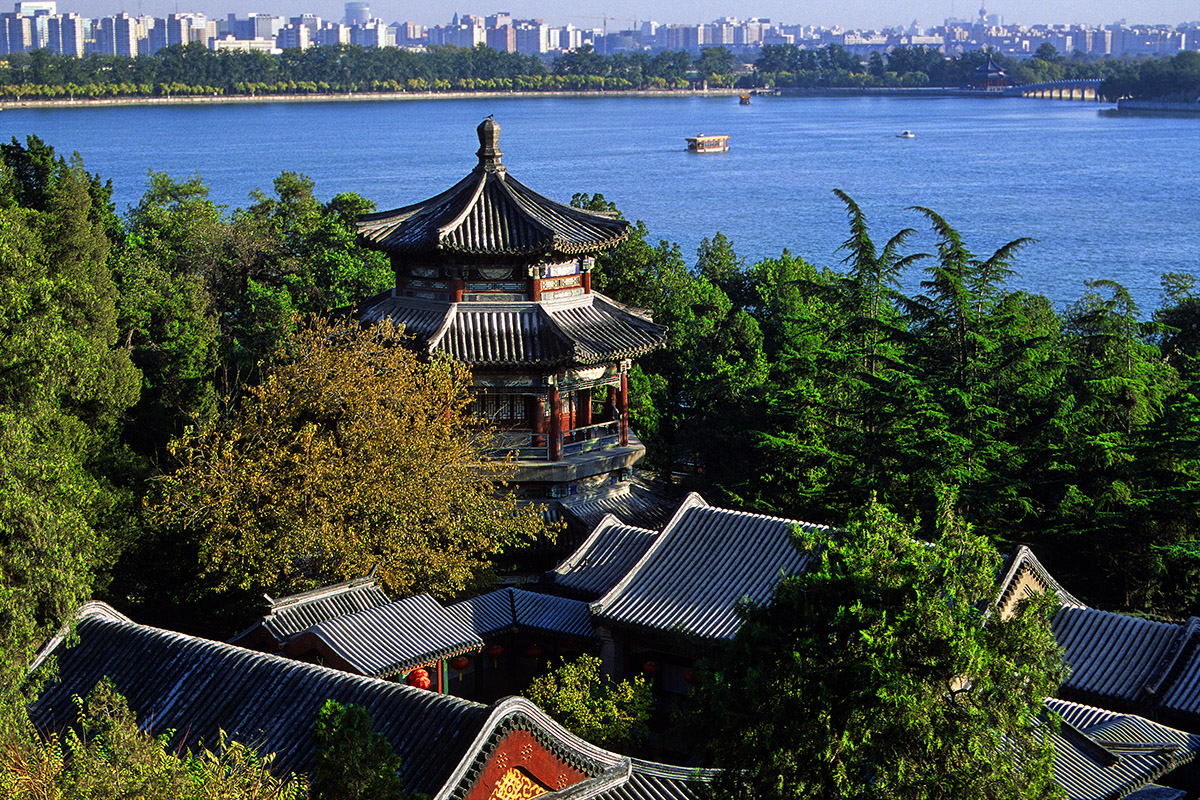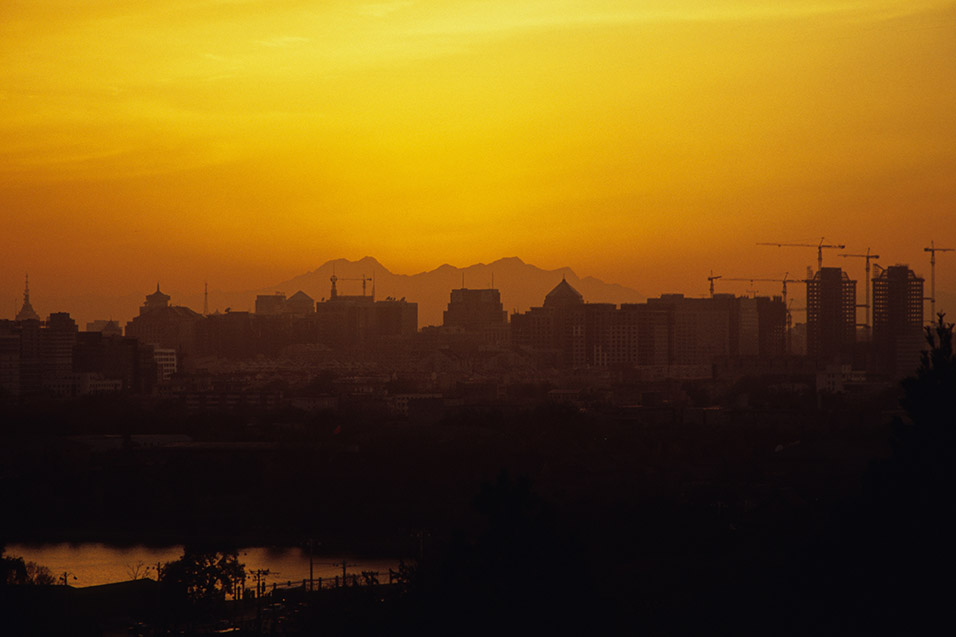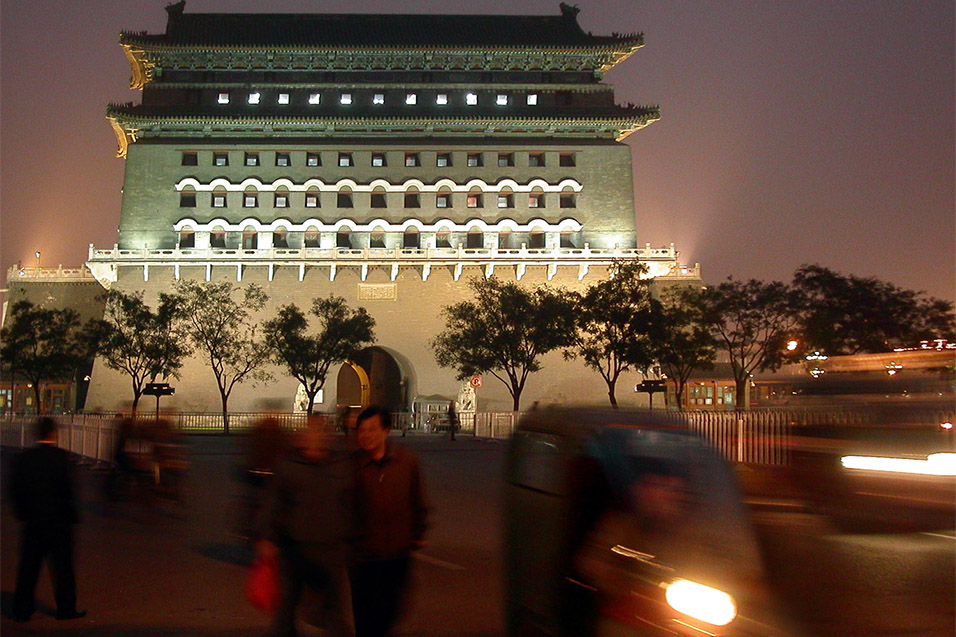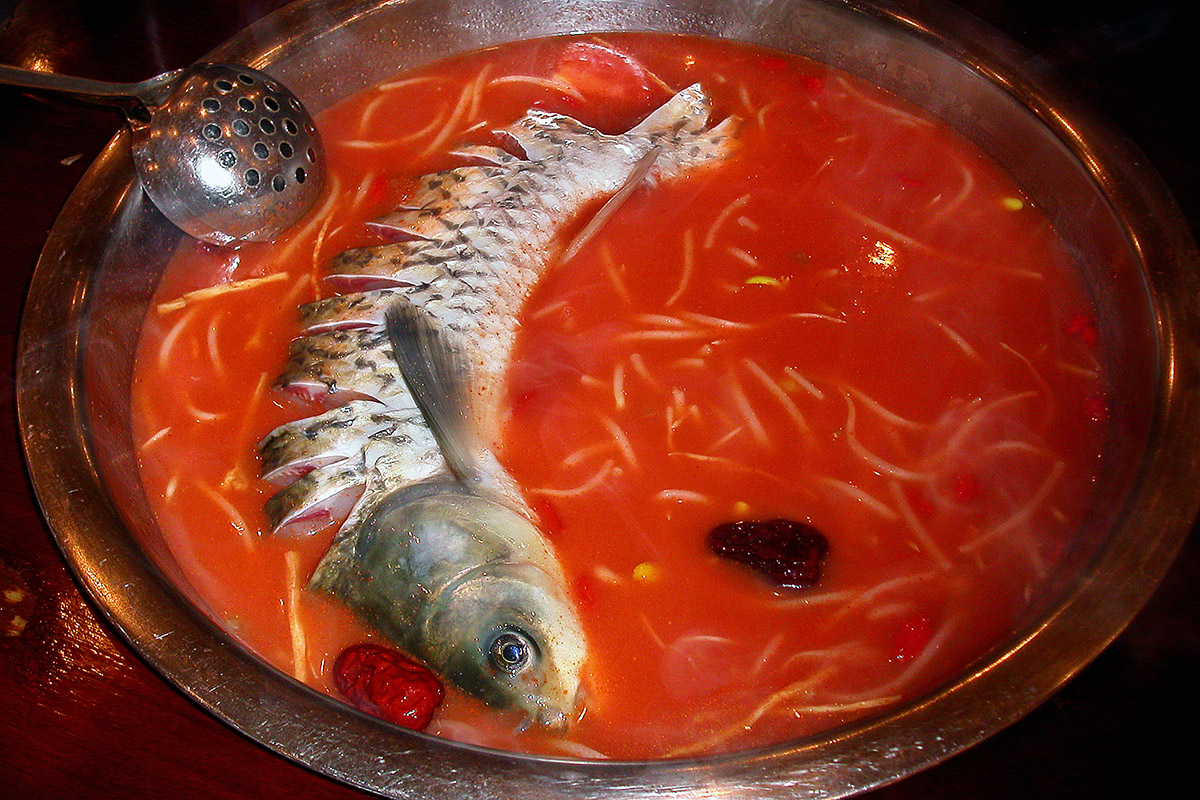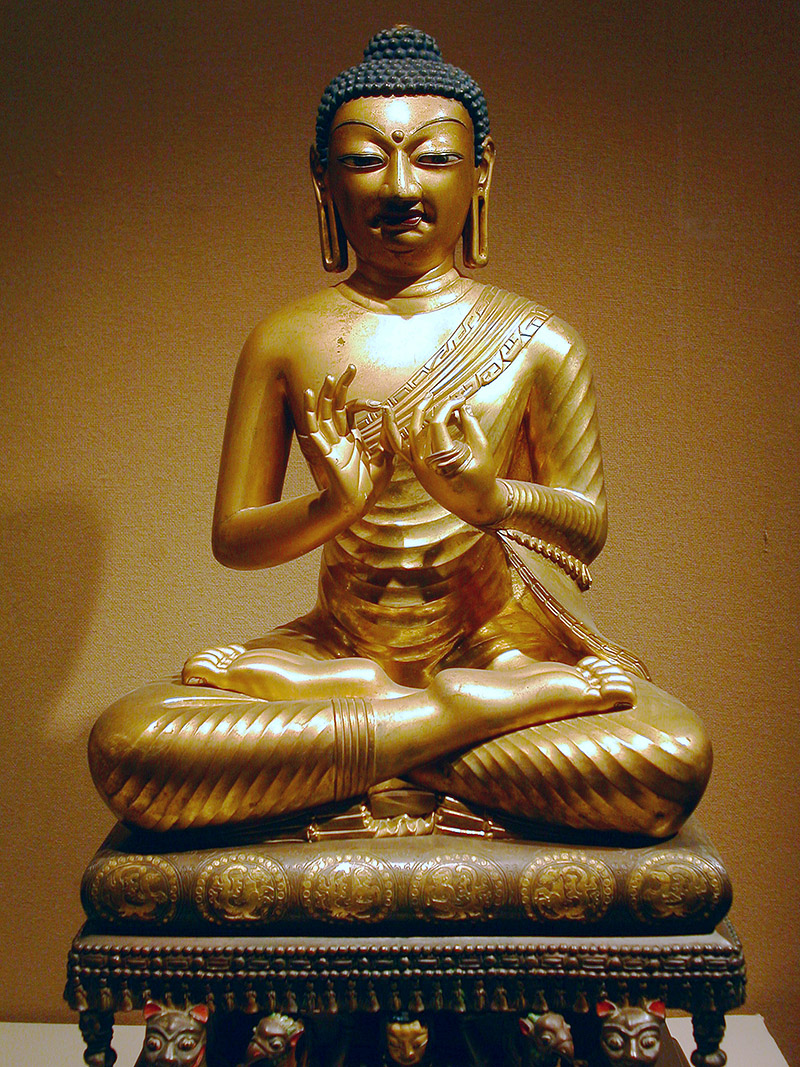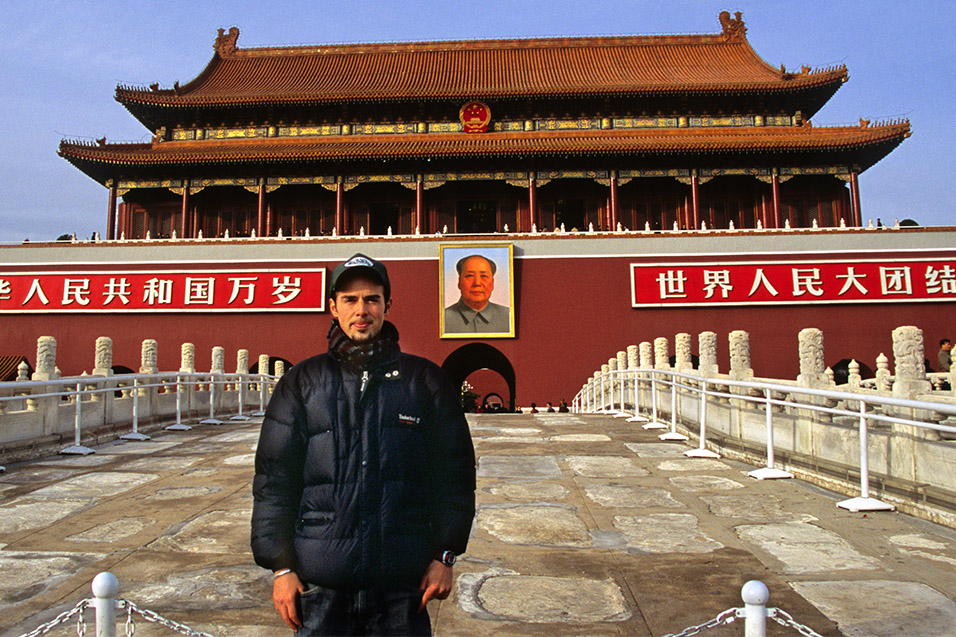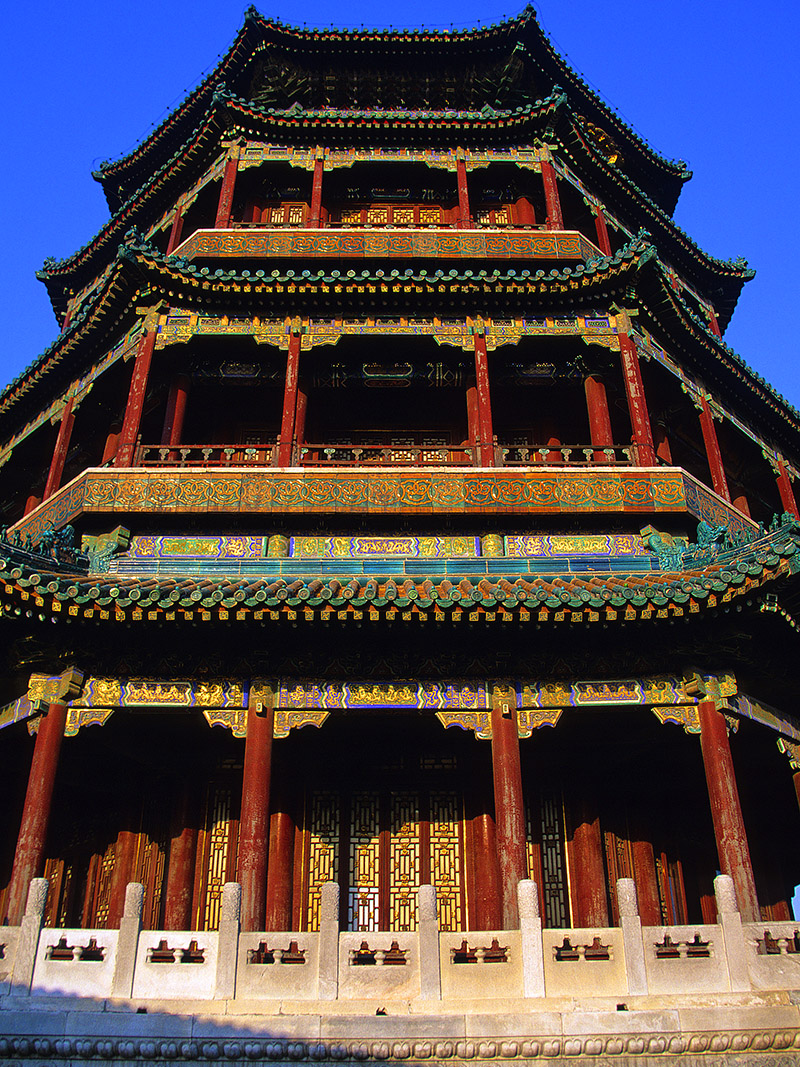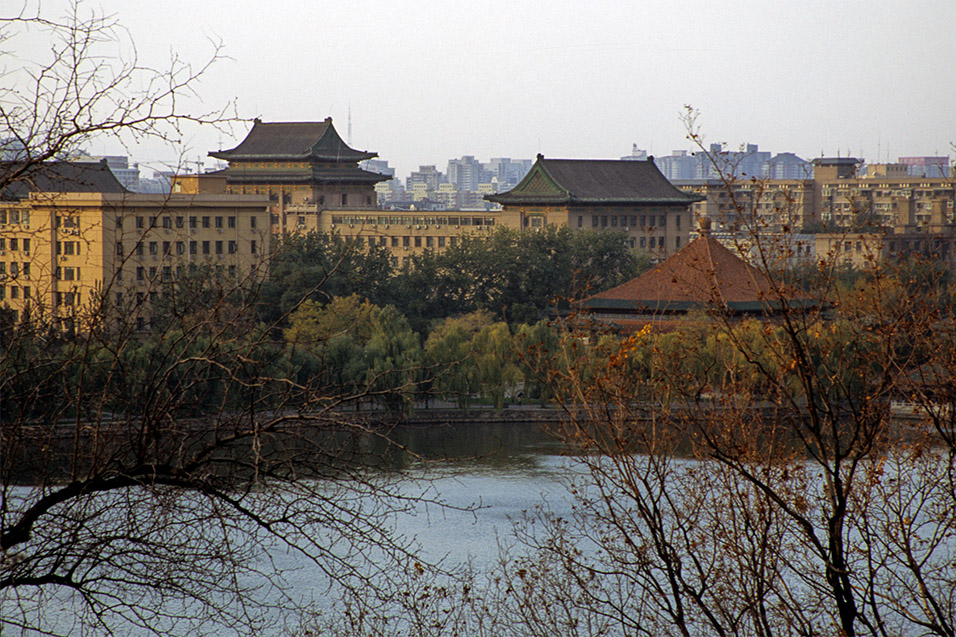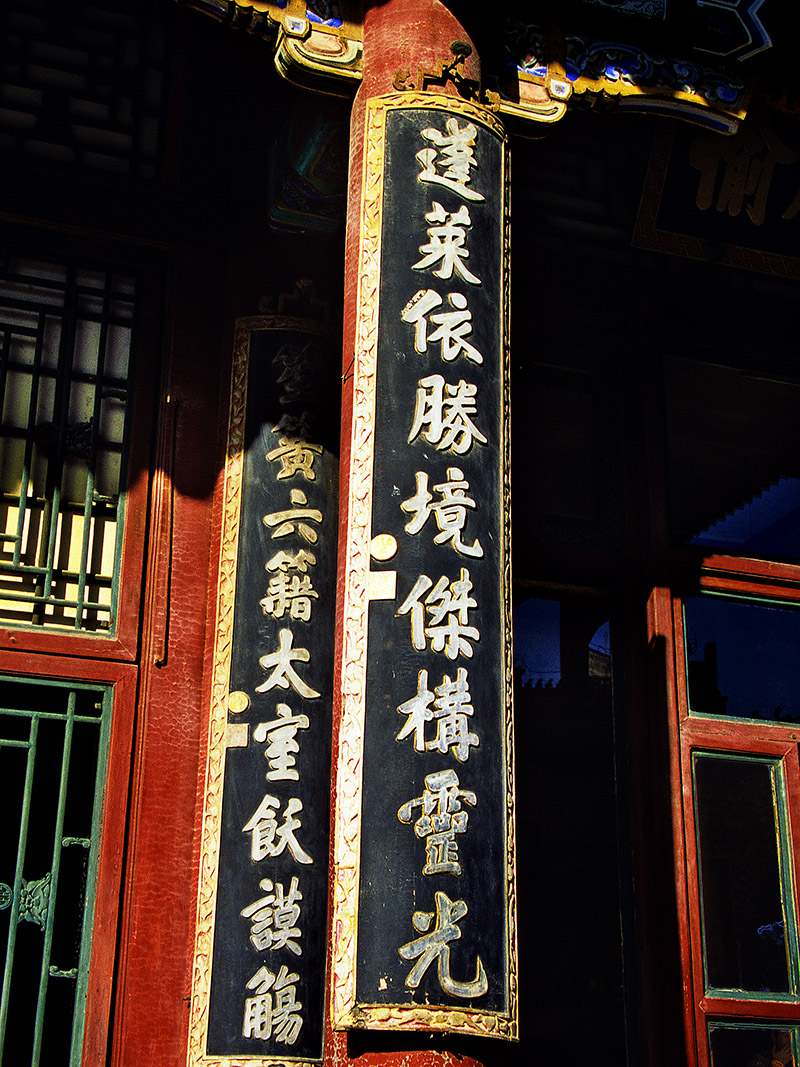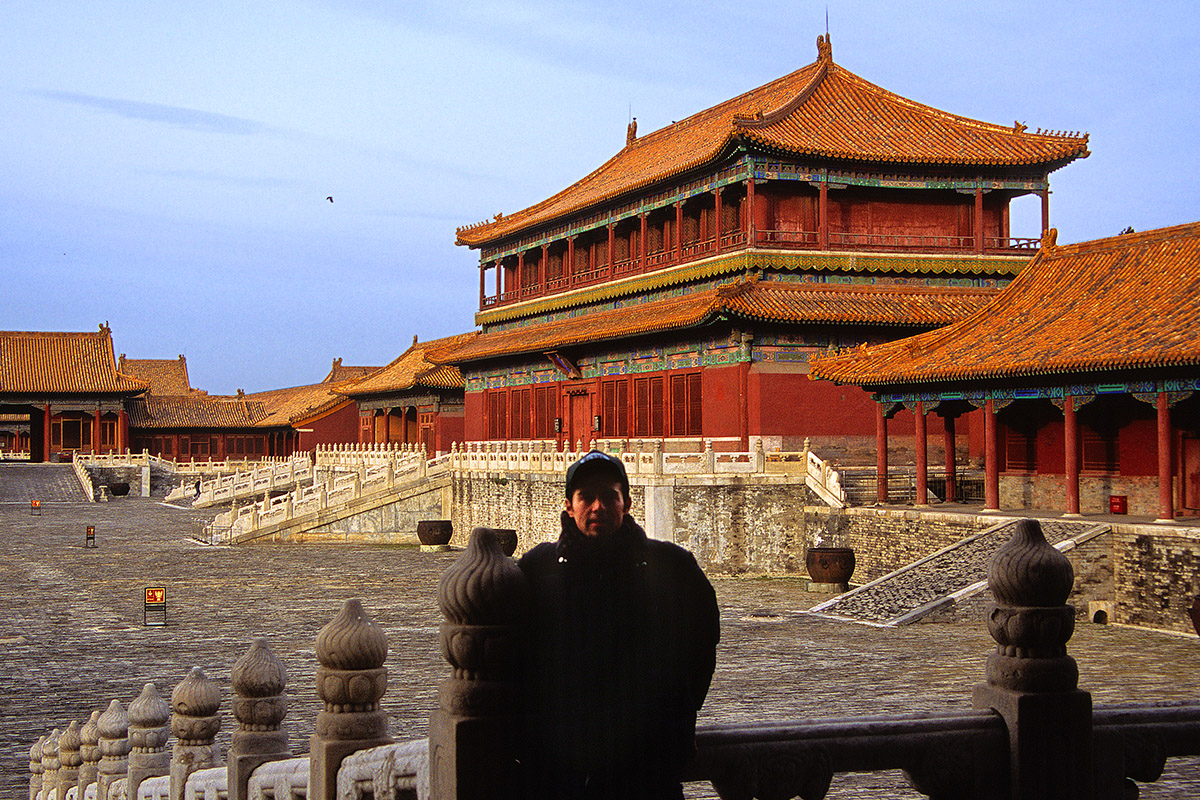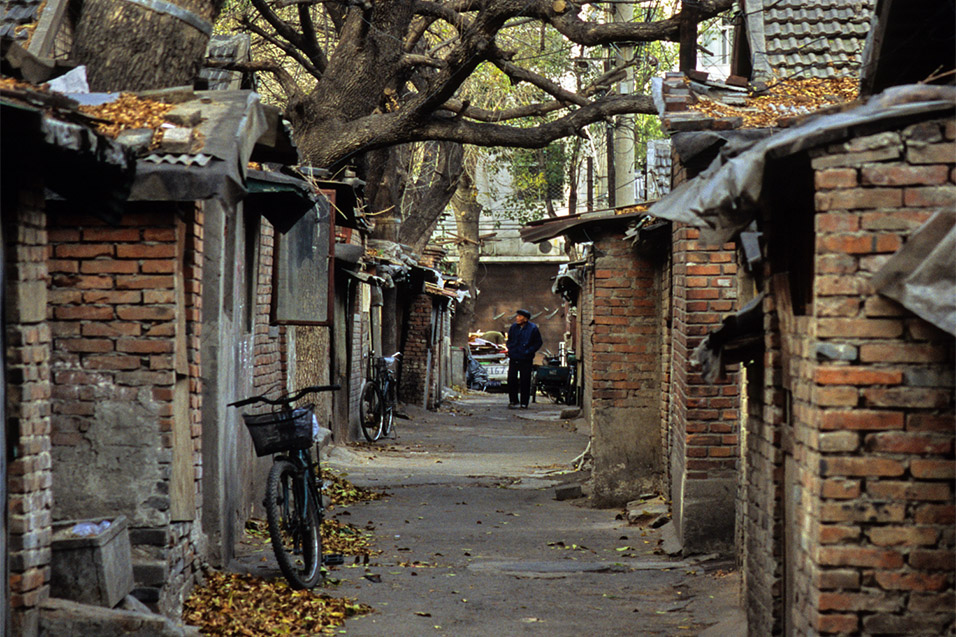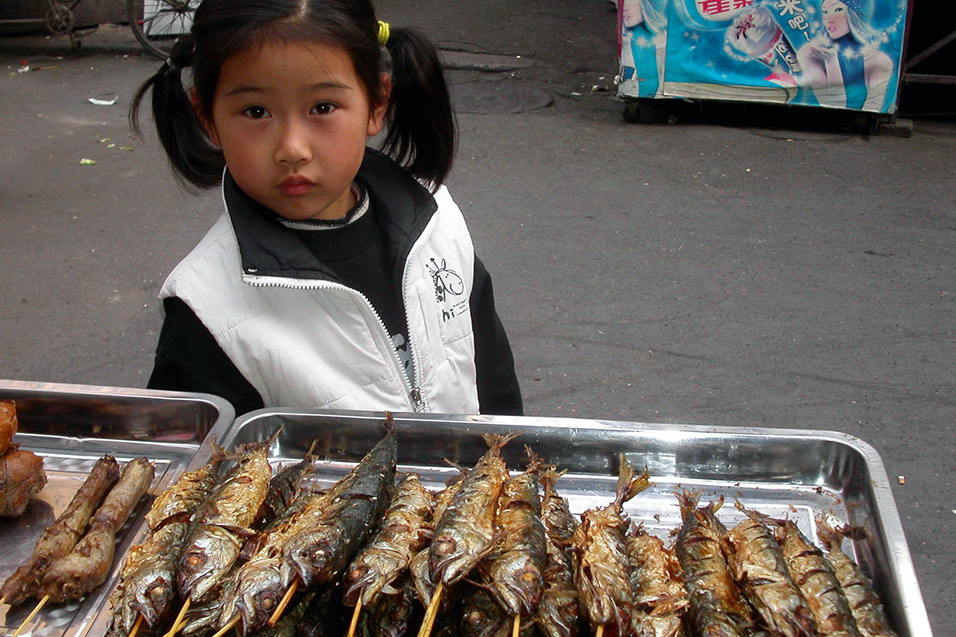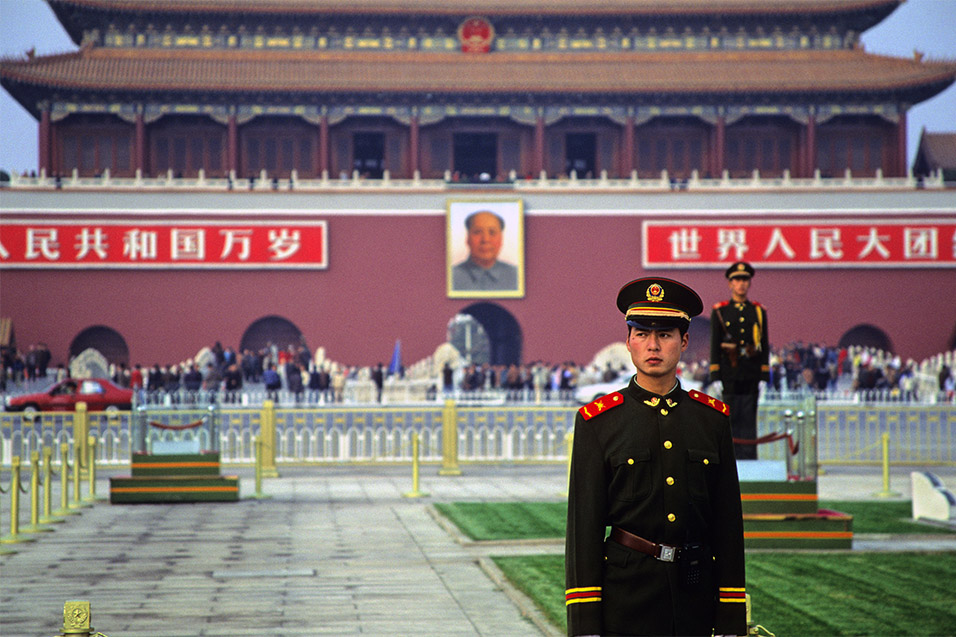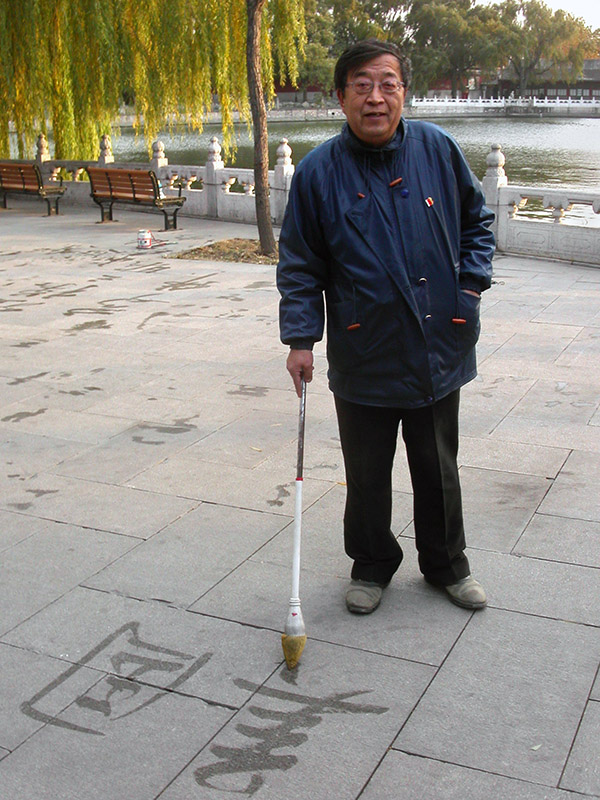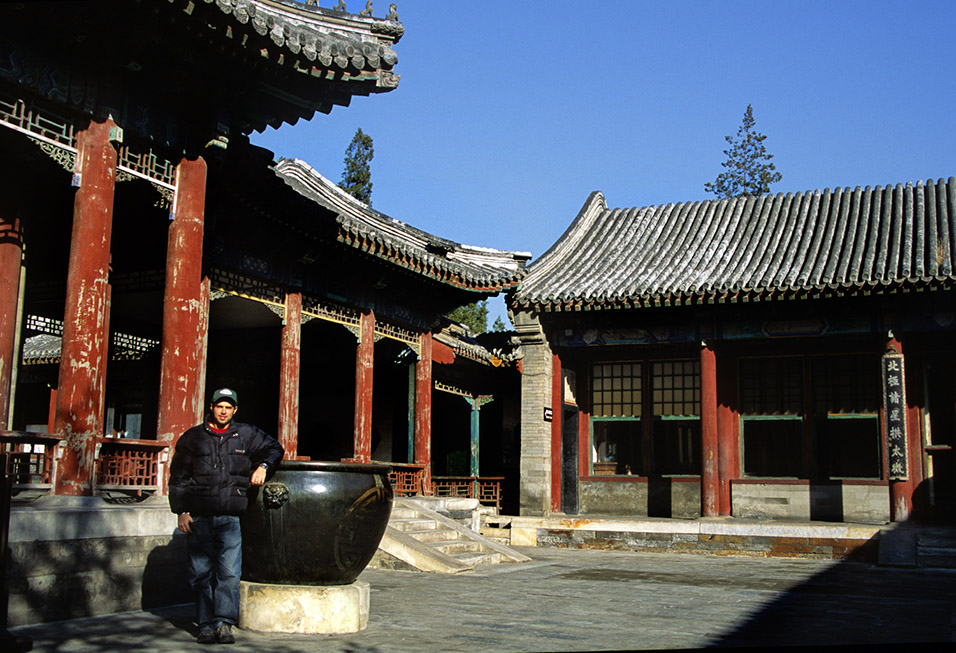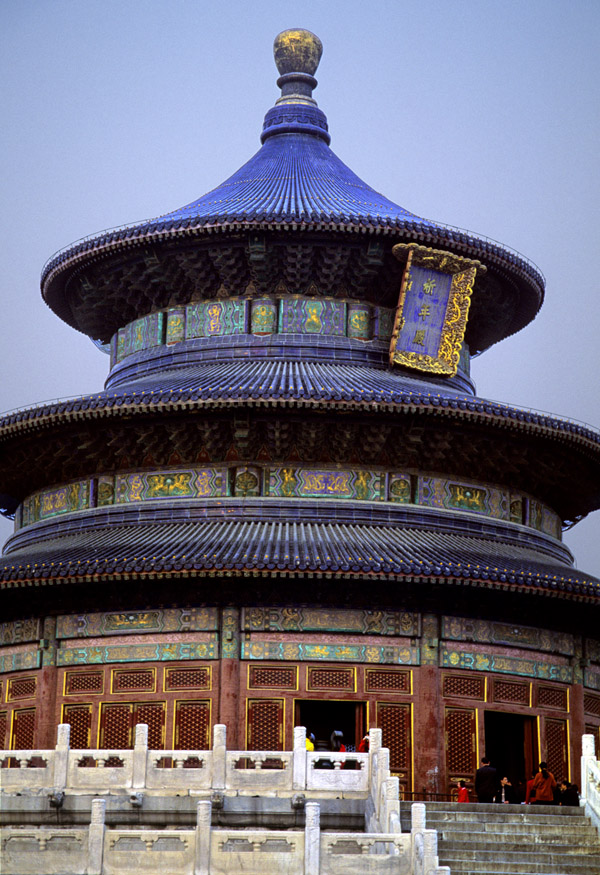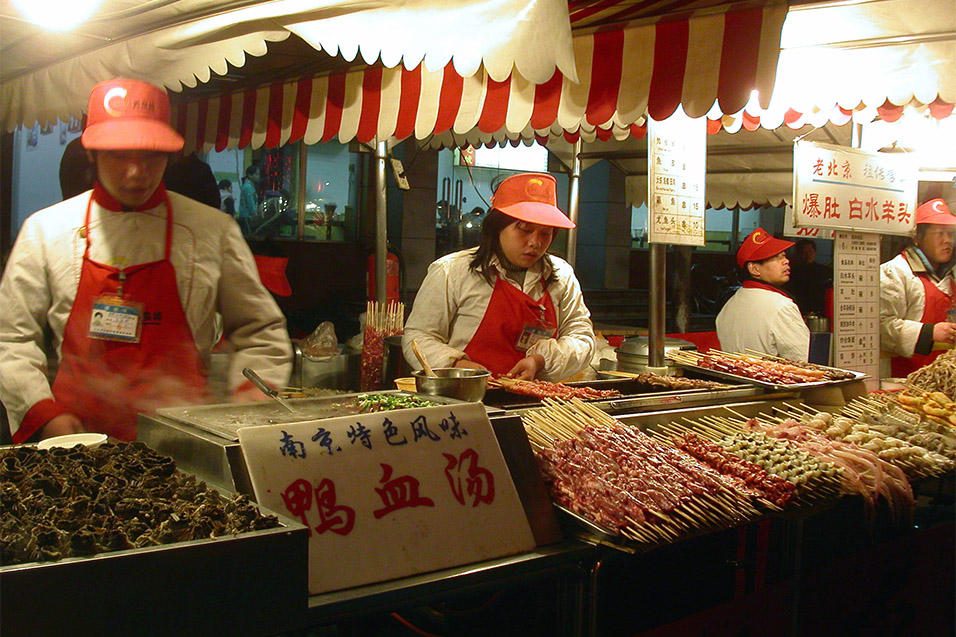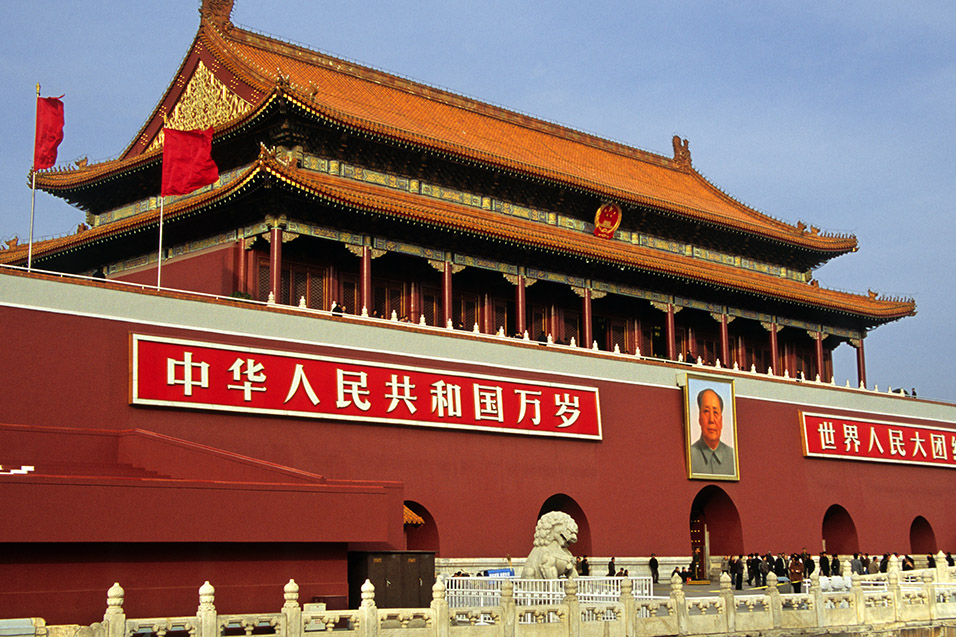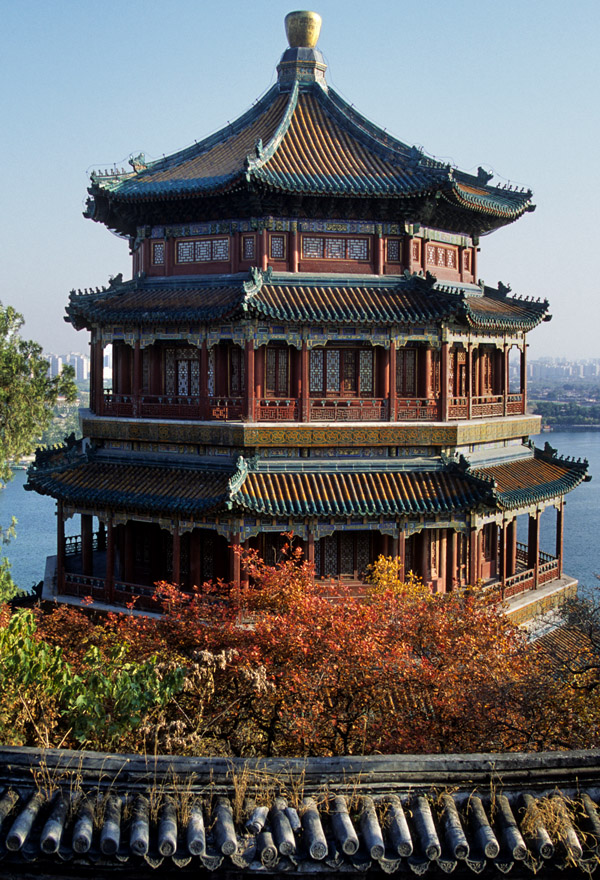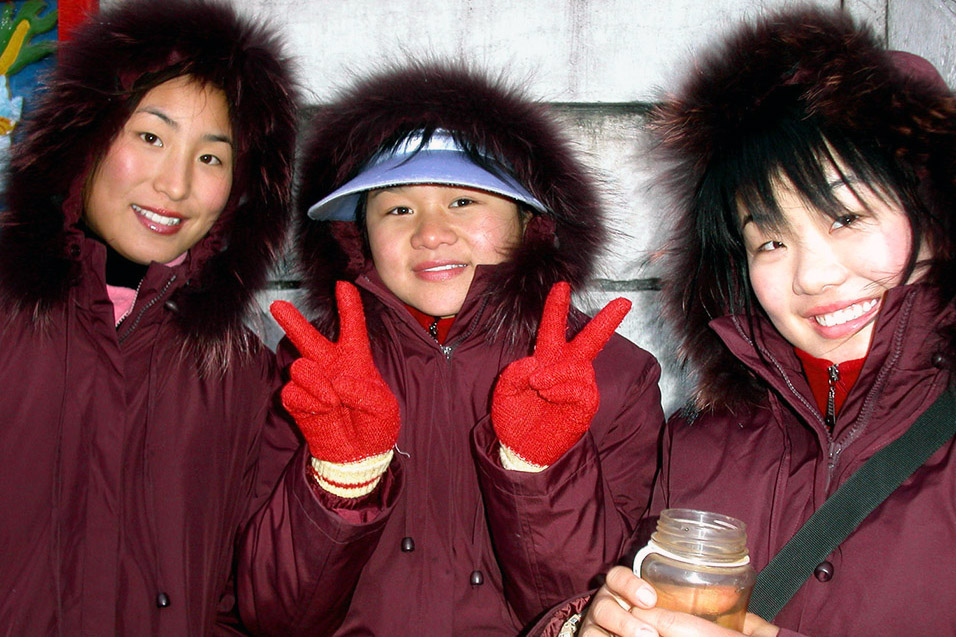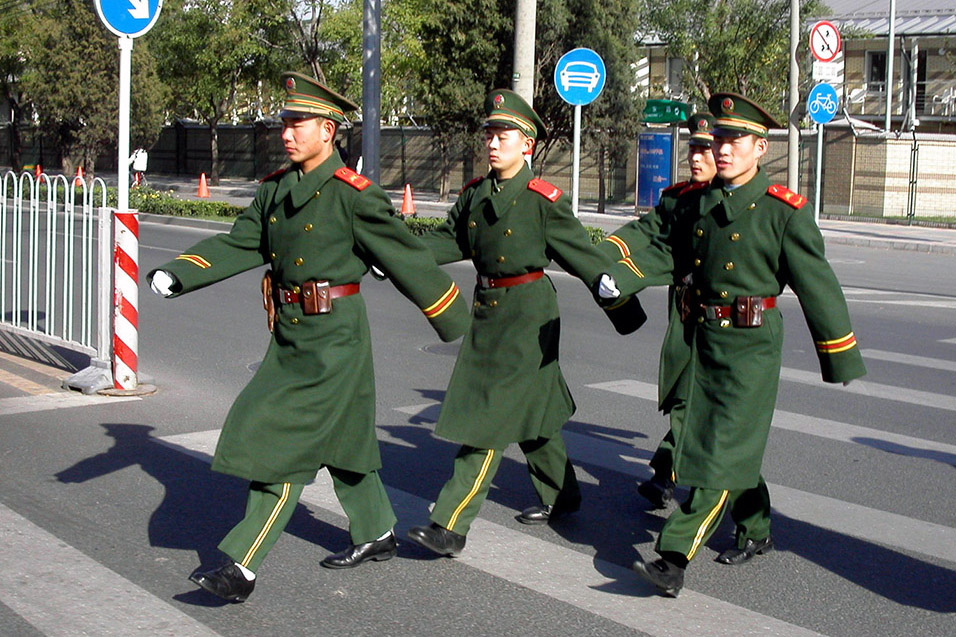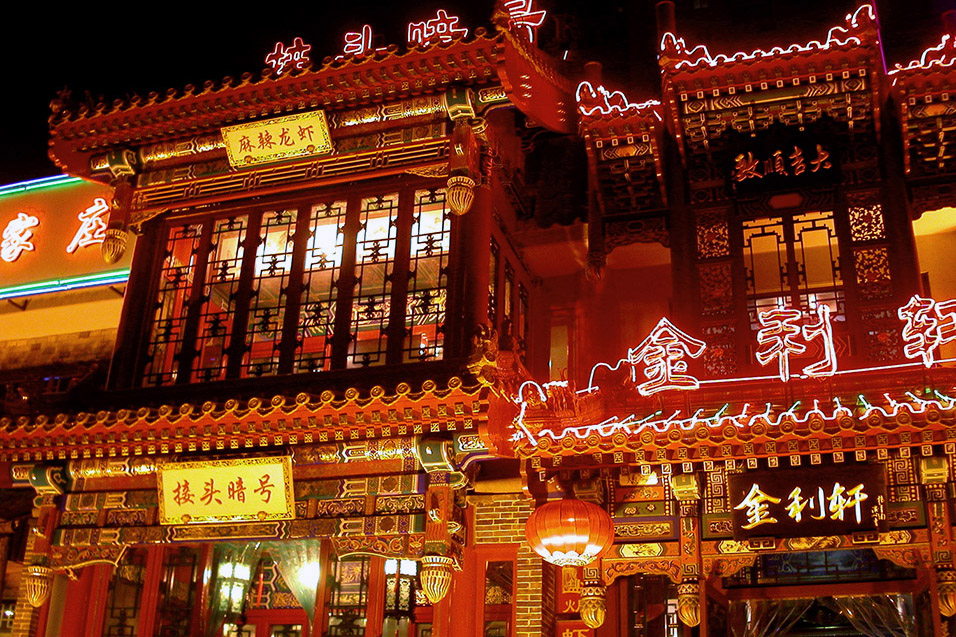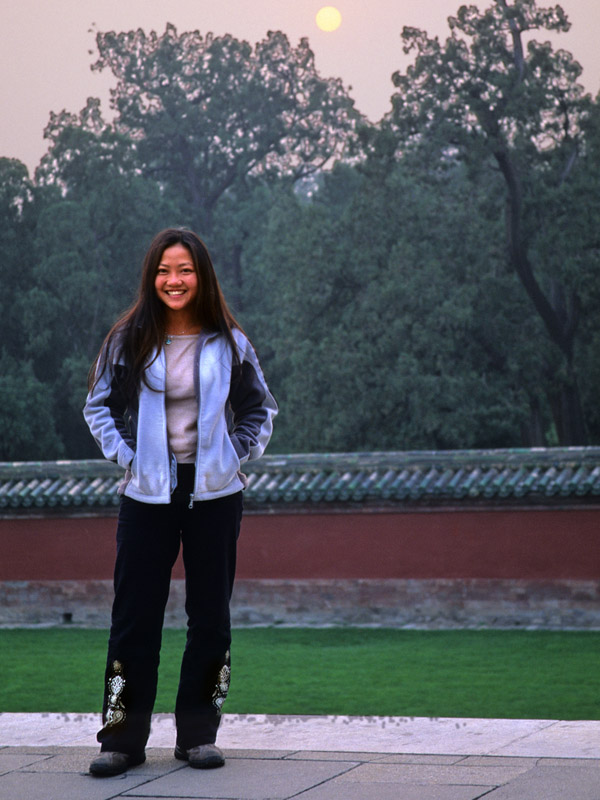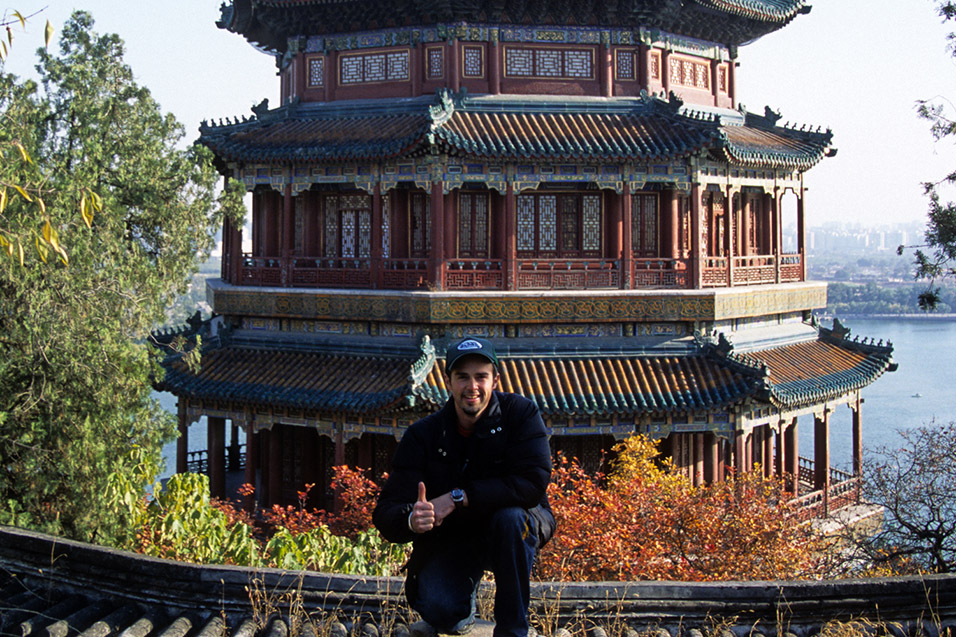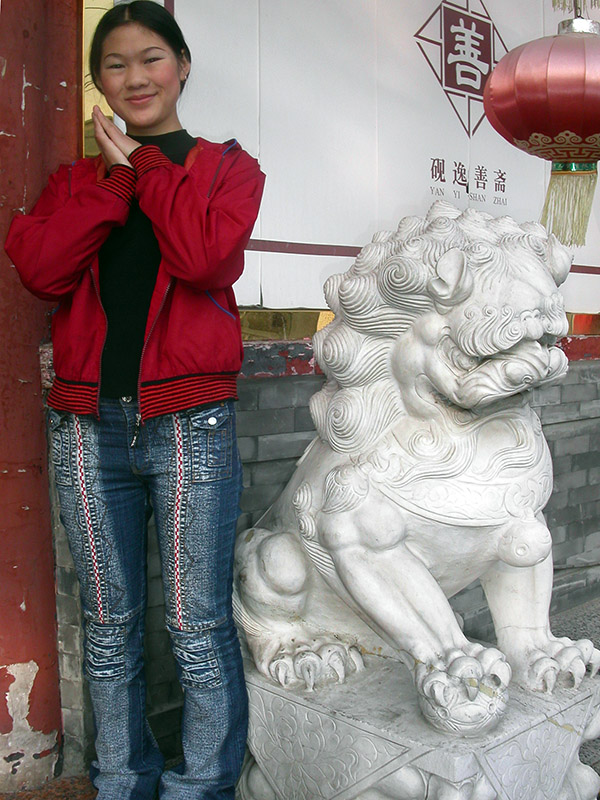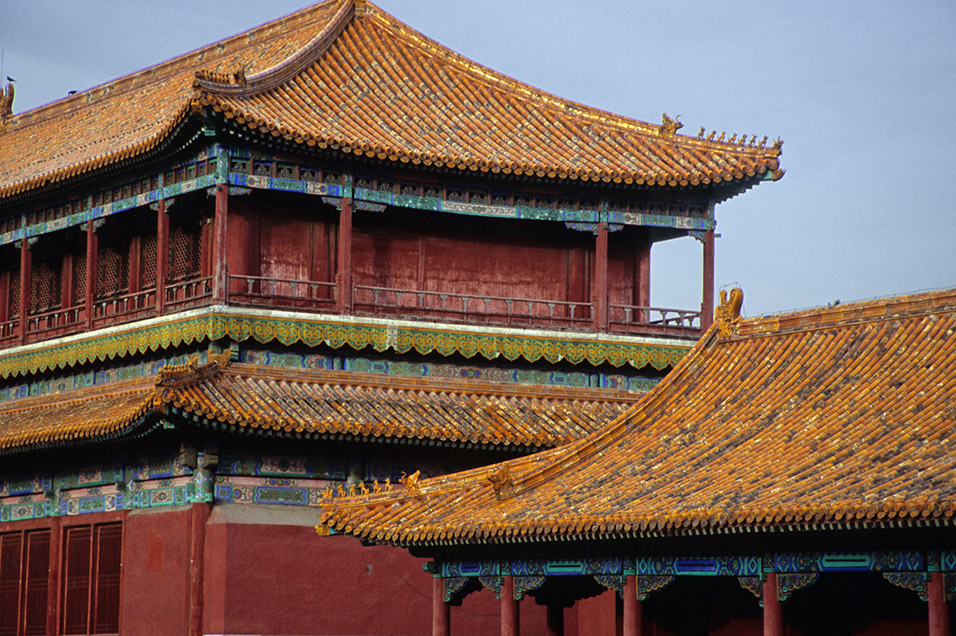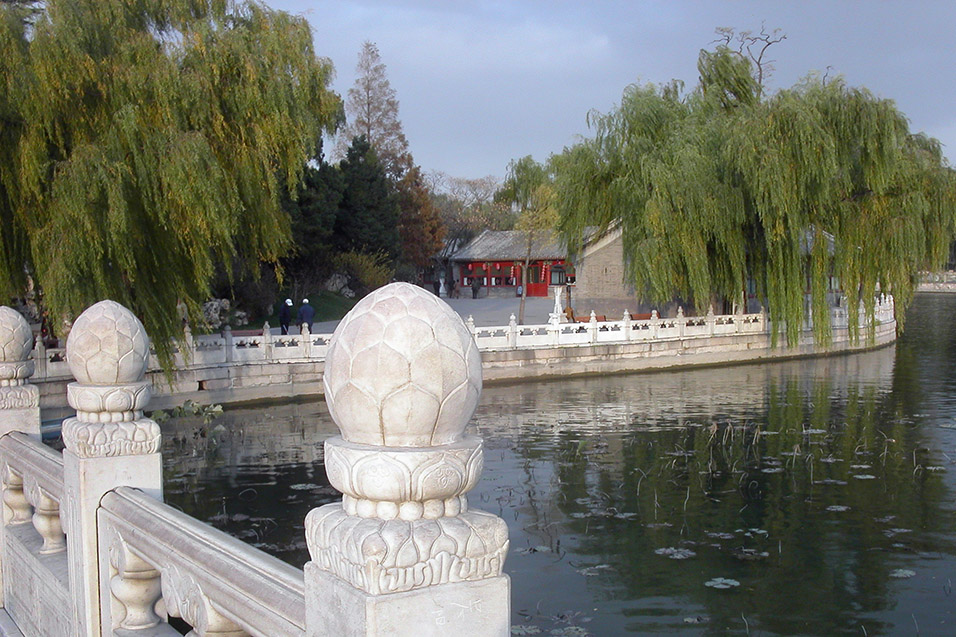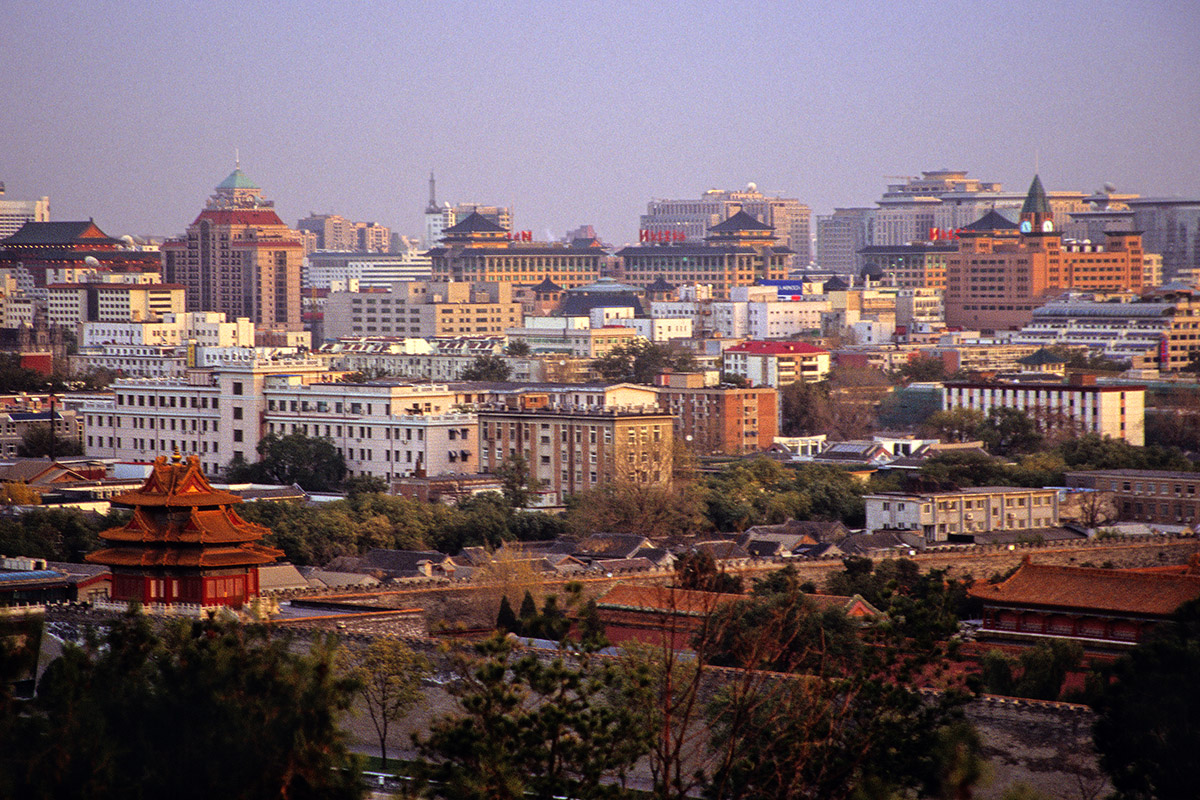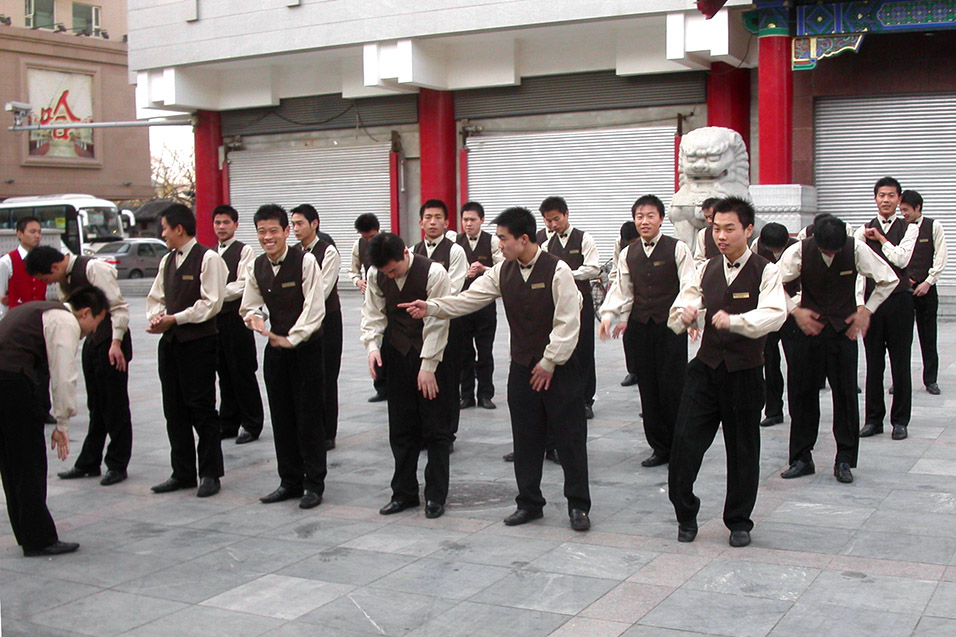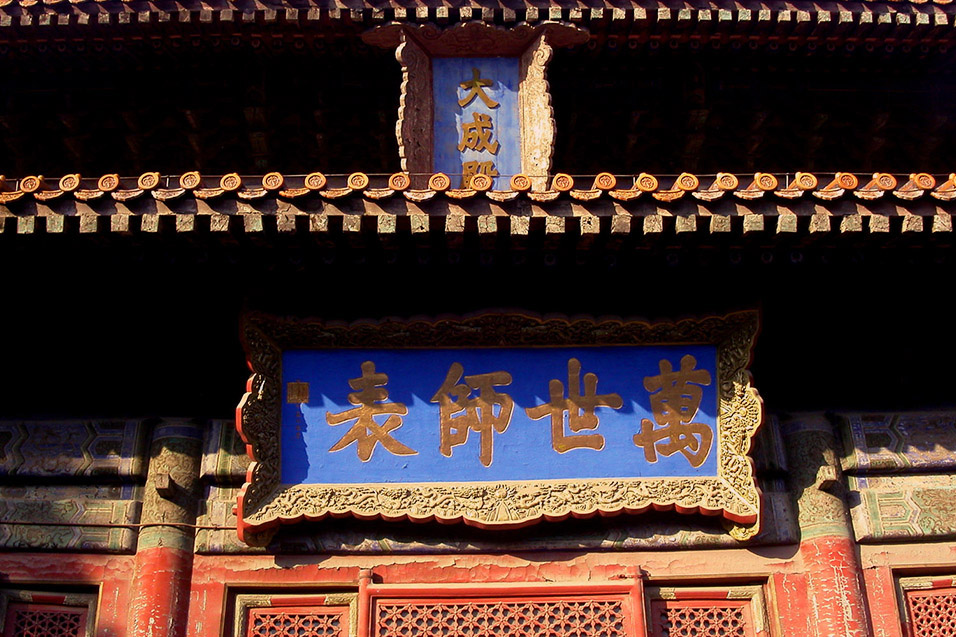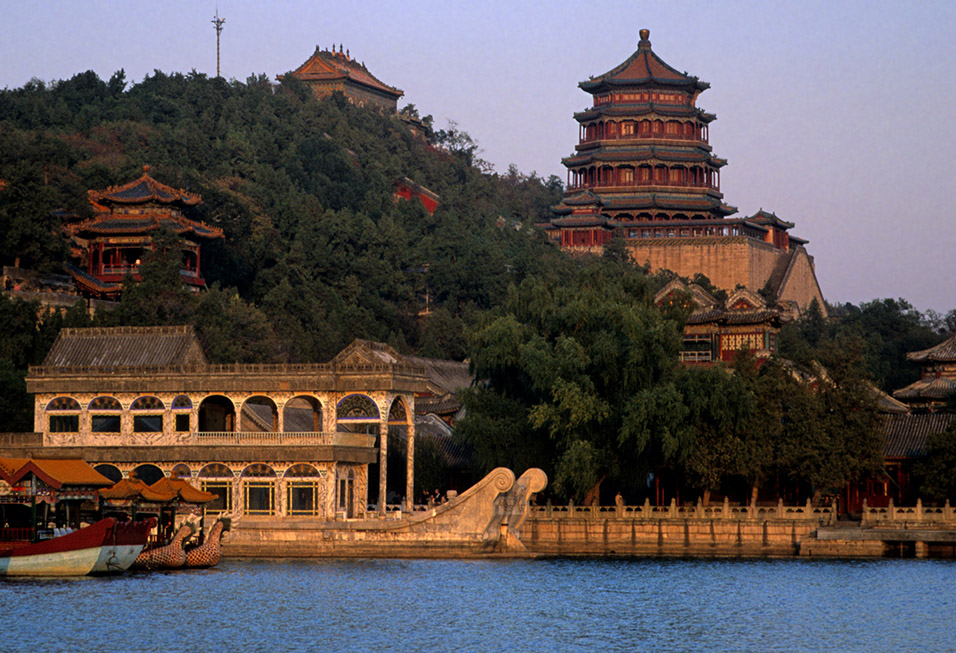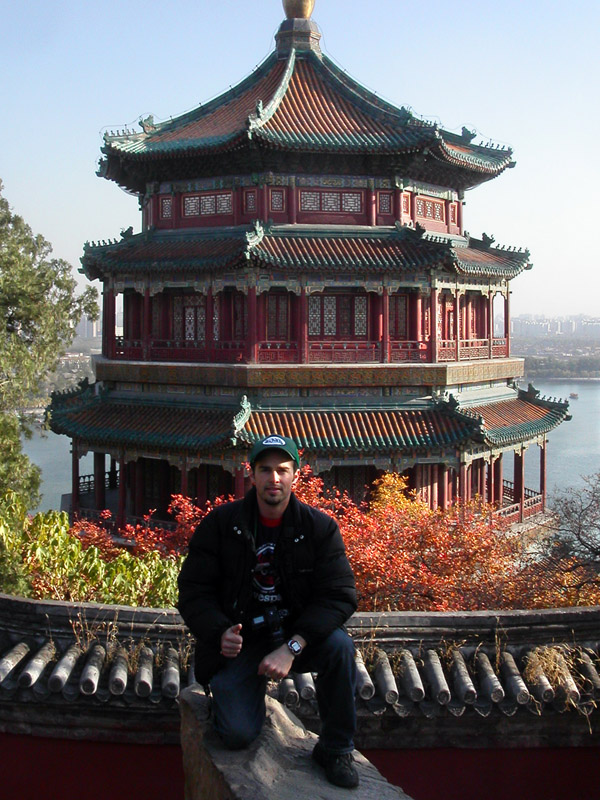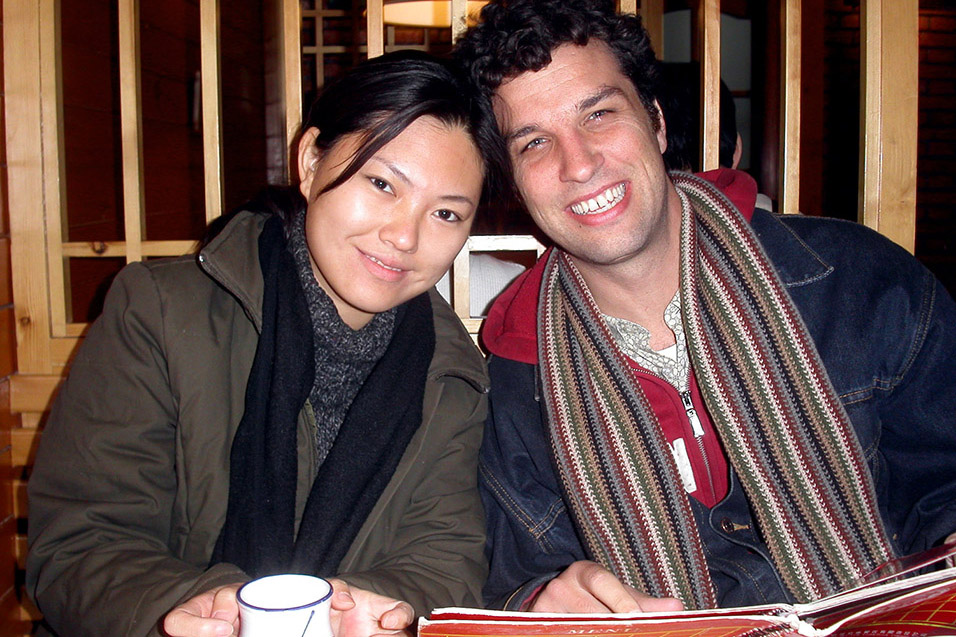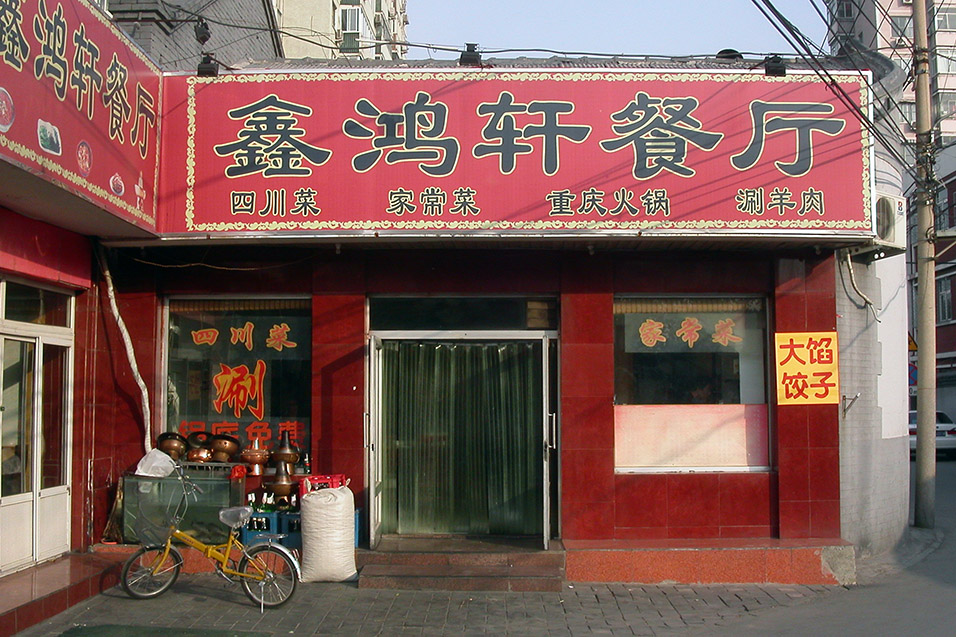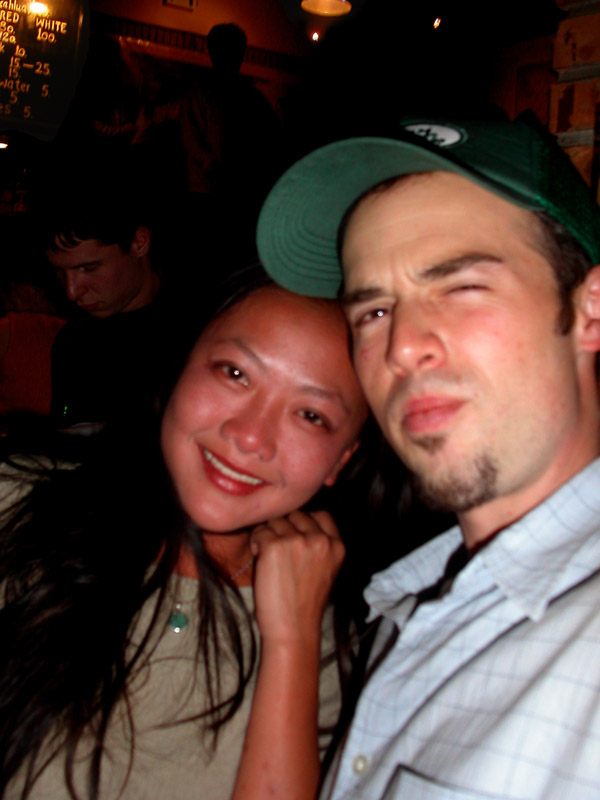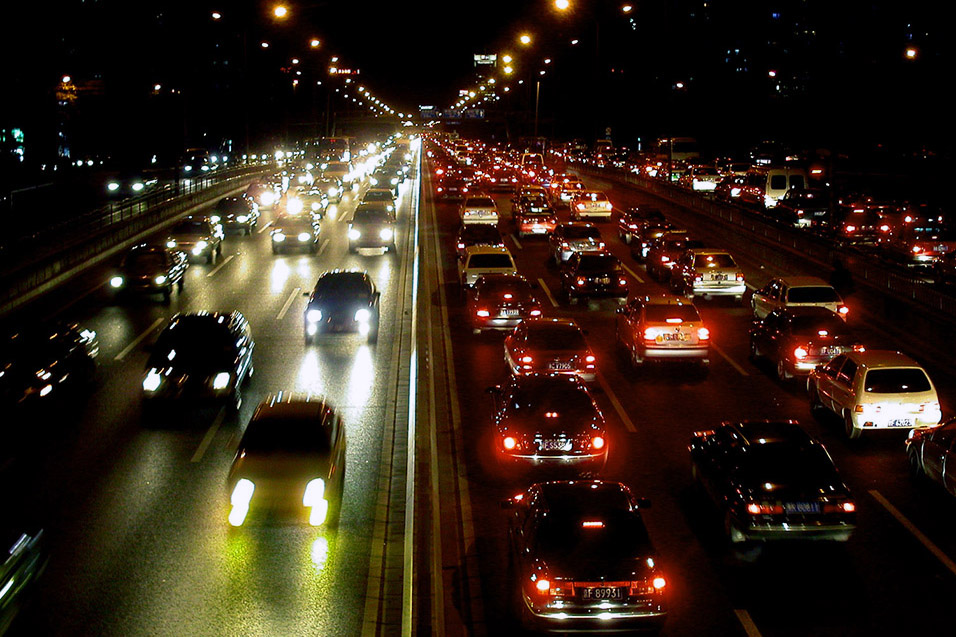November 2004 — China
China, China, China. What is it about China that continually shows me a good time and makes me want more? Certainly it is not the chronic pollution that chokes the cities; nor is it the traffic jams and lingual hurdles I face on a daily basis. And it’s definitely not China's infamous Big Brother bureaucracy that requires five wasted business days to extend my tourist visa. Nope. It must be something else. Perhaps it is the people and the smiles they offer every time I wander some forgotten alley. Or could it be the adorable kids screaming “Ní Hǎo!” and “Hello!” at every turn? Possibly it’s the tantalizing food that tastes with endless delight. Most of all, though, I enjoy the optimism found in China of today — the sense that anything can and will happen. It grabs me. Like it or dislike, all of the above are abuzz right now in the Middle Country and this feeling emanates the cities and consciousness of the people. And now more than ever the Chinese are rediscovering themselves and all that life has to offer — an East-Asian renaissance of sorts. Whatever way, after three months of traversing the Sino landscape, all I want to do is see more of the damnably huge country. I can't say that about most places…
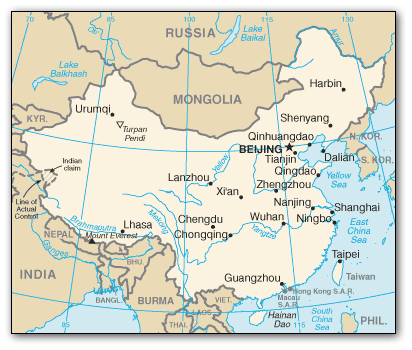
Wednesday, 3 Nov — Port of Tianjin
My Chinese adventure begins on a smooth 25-hour ferry cruise from Seoul to Tianjin (pop: 10.4 million.) My ship, the Tian Ren, chugs along and soon we enter the Port of Tánggū, Tiānjīn’s harbor. I never heard of this mammoth city before, but judging by the size of it's port, China is thinking of Tiānjīn in a BIG way. Afterall, this is the place where all those "Made in China" things are shipped the world over. My hopes of disembarking soon fade as my harbor tour continues for hours. We pass hundreds of new and rusty ships awaiting their load. Next to these boats are "Empire Strikes Back" Imperial Ice-Walker freight cranes lifting, pushing, pulling and loading this universe of cargo. Then there are archaic industrial complexes: oil refineries, electric plants, and storage facilities all plugging away in a racket of noise. Something illegal must be going on here. Thankfully, our captain eventual finds a parking spot and we dock. Disembarkation is easy after a quick wedge.
 A fellow named Glenn, who I met on the ferry, and I manage to migrate over to Tanggu Railway Station 塘沽 train station and board China Railway 4420次, 8车, 42号, for 14元. The train departs on time at 4:28pm and soon I am a slo-training to the China’s heart. We head west and on the train we meet a jovial Chinese family and exchange smiles, snacks, cheers over beer and the ocasional limited language exchange. After what seems like hours, espeically for such a short distance traveled, we fnally arrive to Beijing 北京.
A fellow named Glenn, who I met on the ferry, and I manage to migrate over to Tanggu Railway Station 塘沽 train station and board China Railway 4420次, 8车, 42号, for 14元. The train departs on time at 4:28pm and soon I am a slo-training to the China’s heart. We head west and on the train we meet a jovial Chinese family and exchange smiles, snacks, cheers over beer and the ocasional limited language exchange. After what seems like hours, espeically for such a short distance traveled, we fnally arrive to Beijing 北京.
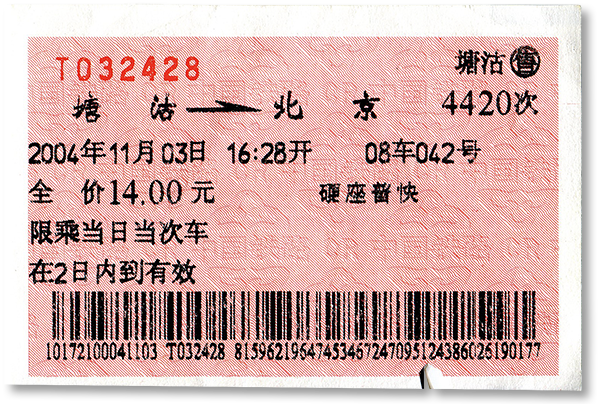
Friday, 12 Nov — Beijing
Grand and historic Běijīng (pop: 13.8 million) is located in the same place I last left her in 2001. Not much else seems the same. Upon arrival, I try to find my old hostel, but to no avail. Instead, a taller building stands with gleaming lights and a pyramid on the roof. A tempting Mercedes dealership is next door and beyond is a Boeing office (just in case any passer-byer wants a 747-400.) “Heavens!” I yell. “I didn't know China is changing THIS fast.” My taxi driver, in limited Chinglish, quickly responds, "hostel no more." I suddenly accept fate: Běijīng is growing and transforming in a BIG way and 2008 Olympic craze isn't helping matters. Personally, I happy about this prosperity for China and believe that improvement is good. However, I soon realize that among all the dust and high-rises, an ancient and mystical era of China is disappearing forever. Well, that is exactly why I am here now, to see Běijīng before what comes next.
My ten productive days in Běijīng are spent touring the never ending cultural relics of the country’s last thousand years. I hike the Great Wall for three days, laze around the Míng Dynasty Summer Palace and find love at the Temple of Heaven. At first, Běijīng seems like a belching and unforgiving monster. Soon, though, I rent a bike and am simultaneously given the key to the city. Whomever planned Běijīng's municipality deserves an award and should consult in the West. True, Běijīng's main drags are a bit wide, but this allows for tree-lined side roads where bikes are king. Běijīng is the PERFECT city for biking; and in fact, a recent study suggests that bikes beat both taxis and buses during rush hour commutes across town! It's no wonder there are hundreds of others with me as I bike and bike for hours and days discovering temples, parks and the disappearing hútòng 胡同 — Běijīng's feng shui alleyways famous for neighborly vibes and family life.
Larry Harvey (Burning Man envisionary) would be highly impressed with Běijīng and all of China for that matter, for I think he would agree that China is Burning Man 24-7-365. For those of you who don't know what I mean, let me explain. Foremost are the are the bikes: Again, they are everywhere. Folks are constantly peddling whether the weather is baking, freezing, shining or snowing. And true enough, some of my most favorite Chinese times have been peddling about the wondrous urban and natural sights that spot the country at every turn. Secondly is the creativity. Like Burning Man, anything can and will happen in China. Wacky inventions are everywhere from motorized chili-pepper crushers, to the guy on the street refilling disposable lighters, from the three-wheeler, smoke puffing tractors, to automatic chestnut roasters, and flying, battery powered Frisbees. Things of beauty and ugly are built, fixed, and destroyed in the blink of an eye. And finally, and most of all, there are the lights. Like at Burning Man, the moment the Chinese sun goes down, the whole place become a kaleidoscope of flashing, blinking, and strobing rays. Las Vegas might become jealous. The high rises are especially interesting and provide hours of glimpsing pleasure. Look out Black Rock City…
Běijīng nights are spent with my old university pal Luke and his lady (Flora.) Together they help open the door to Chinese cuisine as we sample many of the countries diverse foods. One nights its Guangxi Hot Pot, another its Sìchuān fare, next its Běijīng duck. Damn good. The long lost pounds begin to return and I am thankful again to lug around a bit of a belly.
 After 10 fun-filled days and nights in Běijīng, I don’t want to leave. Yet I reluctantly grab a cab and head to Běijīng West 北京西 train station (be sure and check your ticket to go to the correct station) and board China Railway 2519次, 12车, 13号下铺, for 131元. The train departs Běijīng on time at 7:43pm and heads southwest toward Píngyáoo Ancient City 平遥古城. I have the lower berth for this journey, the xià pù 下铺, and though not my favorite berth level— simply because everyone sits on the lower berth and chats, eats, drinks tea, and chews seeds until bedtime— I am still happy to enjoy a night’s rest in hard-sleeper luxury.
After 10 fun-filled days and nights in Běijīng, I don’t want to leave. Yet I reluctantly grab a cab and head to Běijīng West 北京西 train station (be sure and check your ticket to go to the correct station) and board China Railway 2519次, 12车, 13号下铺, for 131元. The train departs Běijīng on time at 7:43pm and heads southwest toward Píngyáoo Ancient City 平遥古城. I have the lower berth for this journey, the xià pù 下铺, and though not my favorite berth level— simply because everyone sits on the lower berth and chats, eats, drinks tea, and chews seeds until bedtime— I am still happy to enjoy a night’s rest in hard-sleeper luxury.
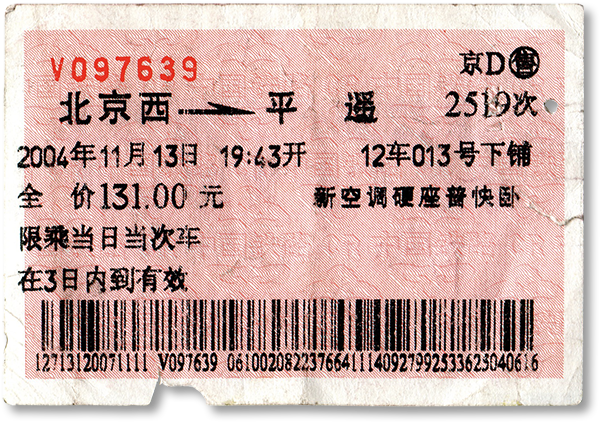
China is a “communist” society is therefore a classless society— so instead of 1st, 2nd, and Shit-class, the convention of hard seat, soft seat, hard sleeper and soft sleeper is implemented. Hard sleeper is second best and good enough for me. As the train rolls on, I sip tea with five others and romanticize the Chinese statistics that while I am rolling down the tracks there are 10,000,000 other Chinese souls training around the massive country with me. That’s a lot! And on the subject, I love Chinese statistics. They are biggest and badest around. Try this one on your lungs: One out of every three cigarettes puffed on the planet is done so in China. Good thing China has banned smoking in the train cars. This nasty habit is reserved in the connection corridors. Or how about this one: China has more than 100 cities with populations above 1,000,000. In fact, the newly formed Chongqing municipality has more than 32 million souls! (Bet you’ve never heard of Chongqing— I hadn’t.) Well, when you have 1 out of every 5 humans on the planet, a lot happens— and if you calculate it, chances are China will top all scales.
6:30 comes too soon and I am jolted from dream land by a pushy steward. “You stop here!” I roll out of bed, scoot off the train and onto the Píngyáo train station platform. A hotel hawk offers me a ride into town. Since I don’t have accommodation, I accept his offer, hop on his motorcycle, and we ride down an old road and into the era of China’s past.
Sunday, 14 Nov — Pingyao
My first thought when I arrive to Píngyáo (pop: 40,000) is, "My God, they finally did invent the time machine!" Píngyáo, unlike the rest of China, seems to have escaped modernization and instead seems stuck in the realm of the Míng Dynasty. Rumor has it that Píngyáo is the only remaining Chinese city that is still enclosed by a complete Míng dynasty wall. Very impressive. I walk the ramparts of the city walls one day and am really digging the Míng Dynasty flavor. Every structure within the cities wall is the same blue-gray color: The cobblestone roads blend right into the brick houses which blend into the tall walls which blend into the guard towers and arches overhead. Suddenly someone yells and seems to be shooing me away. "Now what?" I ignore him, but the man runs up and tugs me away. Apparently I am in the way of a Chinese Míng dynasty period-piece movie shoot. Faux-warriors and peasants are waiting for the camera to roll, and when it does, all the actors spring to action. It is classic. What is even more funny is that about 500,000,000 people will be watching this scene in about six months on one of the many CCTV channels — China's state run television.
Píngyáo is also chock-full of temples and the first bank in China. I visit many historical sites, each more impressive than the previous. The only reminder of the 20th century is my camera snapping away. Unfortunately, time runs short in Píngyáo, and I am soon on another hard-sleeper heading south on an all-night run. Why do the Chinese snore so much on trains? Where are my earplugs?
Tuesday, 16 Nov — Xi’an
Xī'ān (pop: 6.6 million) in Shǎnxī Province was the center of China — and therefore the world — 2,000 years ago. Today it seems like the center of an exhaust pipe. Coughs aside, this bland industrial looking city has tons to offer hidden among the ubiquitous white-tiled rectangular buildings. Quoted as "The Eight Wonder of World" the 2000-year old Qín Dynasty Terracotta Warriors opens eyes wider than the local opthamologist As one Canadian friend asks, "How could you forget about these things?" But sure enough they were… treasures forgotten under tons of earth, these thousands of life-size and lifelike warriors stood and crumbled for 2,000 years until one fateful 1974 day when some humble peasants found them again while digging a well. Amazing. Upon discovery, the Chinese cultural ministry went full swing and deservedly so, elevated Xī'ān as one of China's top tourist attraction.
Xī'ān also has a (mostly) intact Míng wall as well. The 16 kms of wall are bike ridable and I ventured around them one day, but I was turned back at kilometer 12 because "wall closed, you go no further." What a buzz-kill when I have to break my number 2 rule of travel, never return the same way you arrived.
 After three full days touring Xī'ān, and two evening having fun, I head to the Xī'ān 西安 train station and board China Railway 2119次, 12车, 10号中铺, for 117元. The train departs Xī'ān on time, as usual, at 4:59pm and heads southwest toward Chéngdū 成都. I have the hard sleeper middle berth for this journey, the zhōng pù 中铺, which is my favorite of the three, because it is above the busy lower berth (where everyone hangs out), and beneath the windowless and claustraphobic upper berth, which is also hard to access, especially in the middle of the night. The middle berth has a big window, a privacy curtain, and is easy to access. It is by far the best pick, and for that reason, often the first to sell out. Buy in advance, if possible.
After three full days touring Xī'ān, and two evening having fun, I head to the Xī'ān 西安 train station and board China Railway 2119次, 12车, 10号中铺, for 117元. The train departs Xī'ān on time, as usual, at 4:59pm and heads southwest toward Chéngdū 成都. I have the hard sleeper middle berth for this journey, the zhōng pù 中铺, which is my favorite of the three, because it is above the busy lower berth (where everyone hangs out), and beneath the windowless and claustraphobic upper berth, which is also hard to access, especially in the middle of the night. The middle berth has a big window, a privacy curtain, and is easy to access. It is by far the best pick, and for that reason, often the first to sell out. Buy in advance, if possible.
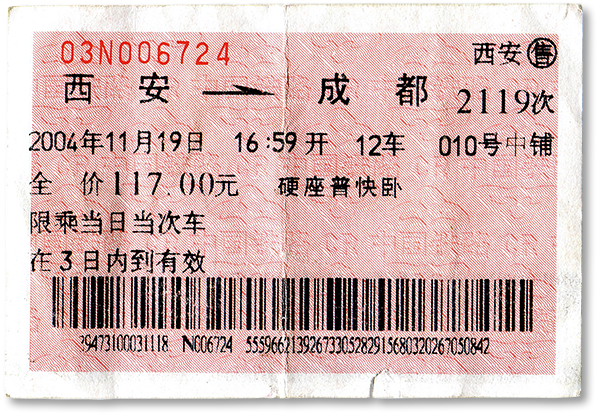
Saturday, 20 Nov — Chengdu
Ah, Chéngdū (pop: 11.3 million) center of the Sìchuān world and home to the Giant Pandas and China's spiciest cuisine. While pandas eat bamboo, Sichuanese eat HOT POT. And it is so hot, that the food actually numbs the mouth. I was eating Hot Pot one night, when I became quite concerned. "Man, they must not have rinsed the pesticides of these vegetables — my mouth is numb!" The locals laugh. The simple say "Ma La!" I repeat "Ma, what?" I soon learn the culprit of my I spent several an evening torturing my taste buds with such local delicacies as Ma La Tofu and Hot Pot. I bought a little bit of the ma peppers and wait 'till my next dinner party. When your mouth goes numb, you will know that it is not the pesticides.
One morning, I try to wake up to visit the Pandas. But it is 8:00 AM and still dark out. No chance of me getting up. And the further west you go, the later it stays dark. The culprit: Běijīng Time. To further its grip-hold on the country, Chinese officials insist that the entire country remain on Běijīng time. So when it is 8:00 in Běijīng it is also 8:00 in Kashgar, 2500 miles to the West, which really should be 3 hours behind. It is kind of cute in a weird way. I guess I will have to try the pandas again tomorrow.
Today I am successful. The hotel staff repeatedly knocks at my door. Visiting the Great Pandas should only be done in the early morning, during feeding time. Afterwards, the fall into a deep slumber for the rest of the day and look more like a hunting trophy than a critically endangered species. Only 1,000 of these bad boys are left in the world. Luckily for me, autumn is baby season, and I get to see several young-ins. The are adorable and play and roam and fight, but all too soon, the fade, and fall asleep. A sign in front of some panda informs "Do not eat wild animals." I am thankful for the words of warning.
One interesting aspect of Chinese travel are the affects of crash-course English learning. Affectionately known as "Chinglish" this form of communication is everywhere from museums, city signs, menus. For instance, at an inter-provential bus station, a big electric-light sign lets me know that "NIFORMATION" is this way. Lucky for me though that there is an English at all. In most stations, there isn't even this much. Along the road, I see another sign for "CLINIC OF TNADRITONAL" as if it would really mean anything even if it was spelled correctly. Engraved in stone at a city park is the following: "The ducks wewe afraid and try to away. A famous Shànghǎi landmark, The Peace Hotel, offers its visitors this bit of niformation: Susiness Hours 5 - 9 Free Soft Drink With Enter. (How thoughtful, and its the least they can do considering their patrons are paying $100s/night to stay there. Chinglish is not a derogatory term as even the Chinese themselves call it that. And I am not one to tease — you should hear my Chinese, but on this note, it really allows otherwise menial times to be quite interesting. Sure, for the menu it is OK, but you would think that before a museum engraves something on stone, it would at least overlook its pride for a minute and have a fluent speaker look over the contents.
And then there are the tones. As one courteous Aussie once put it, "Your tones are off Mate!" And he ain't kidding Chinese would otherwise be a simple language to learn if it weren't for these bastardly tongue twisters. Chinese lacks tense, plurals and articles (a, an, the). Instead though, it adds those tonal sounds that elevates it to an almost impossible language to master if you. Here is an example. In the center of China you will find the Shānxī 山西 province. Next door, it is Shānxī 山西 province. Try saying them one after the other. I sure can't tell the difference. But to the Chinese, the difference is as clear as California and New Jersey. And it is the tones that do this. And when I ask for water, I have to be careful, because who knows what will come out of my mouth. Instead of a glass of sustenance, I may get a punch in the nose because I have just called my waiter's mother a fat cow! Nonetheless, I have found Mandarin to be a fun language to learn, and moreover, the pictographs (Chinese characters) I love! I can already read many words including China, Beer, Gas, Man, Woman, Internet. The first hundred or so are easy, but after that is an uphill battle, and considering that it takes 2,000 characters to read a newspaper, I have a long way to go before I can get any real good Chinese propaganda!
One night at a Chéngdū bar, I met a local named Dave and we speak Chinese politics. The subject, the one-child policy. For years we have been hearing of Chinese preference for males, as they are strong, and can work hard, and can carry on the family name. True enough, there is now a shortage facing Chinese males: a lack of dateable women. It is a tragedy. But Dave informs me that the tides have turned. Now, many urban parents opt for a female because maybe "they can marry a rich Chinese business man, or if not, attract the attention of a foreigner." I stroke my goatee as I think of one of these hot Chinese babes stalking me. Hmmm.
Tuesday, Nov 23 — Chengdu
To: Mom & Dad
Subject: China
Hi, Yeah, I’ve thought a lot about the fact that the world will not be so exotic. Remember, though, everything always changes, and these people are happy to share in the West’s ideas. I really wish you could take a 25-year anniversary trip to China. You would not believe the changes here. Yet, still underneath it all, the people are still very much Chinese, and honestly, I like them. The Chinese of the 1980s were more rural, collective, and traditional. With reform and opening-up, they are reinventing themselves, and although there are many Western influences and temptations here, these people really still hold on to the core values of Chinese: family, food and fun. It is really different from the USA. So in a sense, it may not look exotic, but it still is. In that sense, it seems it is just the big cities that are becoming less exotic. The countryside is eternal and still retains the older culture. Maybe the USA will become more Chinese? That would be great for me. Imagine, people selling dumplings on the corner of Yale and Santa Moncia Bl. Old ladies dancing to stringed music in Douglas park. Old men playing cards in garages and alleys everywhere. I think it would be a lot more fun, for me anyhow.
Yeah, Netflix went down 7 points the first time overnight. And then 8 points overnight. A Stop-loss would have become effective the open of trading, and would have been traded after the fall. It is unfair that we don»t have access to after-hours trading.
And as for international trading, some will disagree, but I still think a long-term buy in China is the best. Loooo000ng term. If only 150 million Chinese become wealthy (which there already are) this economy will be bigger than the US. It is just a matter of time. I am sure there will be booms and bust here, and it will be a roller-coaster ride, but many individual Chinese (and the governement) are investing heavily in China and themselves, and things are rapidly improving here. I wish the USA would begin to invest in itself again, instead of investing in Iraq, and better yet, I wish FORD would build more hybird vehicals, like Toyota, so we could ween ourselves off of oil. Oil is a dead-end street, and the root of so many problems. Yet because the US is a “democracy” we cannot think long-term like the Chinese government can. They focus more long-term, which has many benifits. I guess the only problem is ensuring leadership remains good.
Also, I have a feeling that the Chinese Yuan will be de-pegged from the dollar about 6 months before the Olympics. That is just a speculation I made up. But it would make sense for them, especially if the Yuan is going to rise, as many think it will. Then again, it all could bust. But either way, it doesn’t matter, because the infrastructure is already here.
I think India would be a good investment too, but I cannot find a mutual fund that I like. India’s economy will continue to grow rapidly (as will Sri Lanka’s if it can stay at peace with itself.) Even though India is a circus, there are many intelligent people there.
Have fun on your trip. I wish I could go too. Thanksgiving is around the corner, and I am going to be very sad that day. I hope I can find someone to have some food with. I am feeling a bit lonely right now. But that is life. Please eat an extra portion of mashed potatoes for my, and promise that we can do a late Thanksgiving when I come home.
I will fly to Lhasa on Saturday. Here is a weather link. It is going to be cold, but hopefully clear. That is why I tried to go this time of year, because it tends to be clear. Keep your fingers crossed. From Lhasa Thope to go overland to Kathmandu, if I can find some riders to share costs. If not, I will fly. If I can drive, I will get a view of the North Face of Mt. Everest. It should be good. From Nepal. I will so back to Thailand and then think about the future. Thailand is an ideal place to buy tickets to anywhere in the world. But I am really ready to wind down here and get a place. I would like to be home in Feb so I can catch a bit of the winter or early spring season and play a game of golf or something.
Brian
Wednesday, 24 Nov & Leshan
I take a brief trip down to Lèshān (pop: 3.5 million) to see the Grand Buddha. Grand indeed, as this 71 meters (233 feet) tall Buddha is the largest on Earth. It is so big, that my extended family of 30 or so could picnic on its left foot. And grand he is, as his gaze looks out upon the confluence of two rivers, banks of temperate jungle and the sprawling town of Lèshān. I hike for hours among trees, temples, bridges, and finally set my gaze.
Friday, Nov 26 — Chengdu
To: Mom & Dad
Subject: Happy Thanksgiving
Hi, I hope you had a nice dinner. Where did you go?? At the same time you were eating Thanksgiving dinner, I was watching the Pandas eating a thanksgiving breakfast of bamboo shoots. It is birthing season, so there were a couple infant Pandas. The really young ones look like screaming rats, but the yearlings were very fiesty and cute.
As for me, I enjoyed a nice teahouse experience and then a famous Sichuan hotpot for thanksgiving. The hotpot is a big pot of boiling broth, one side is a chicken soup broth and the other side is firey hot broth with oil and about 100 pinkey sized chilies and 100 ma-la peppers (numbing peppers.) You then dip and cook mushrooms, tofu bits, lamb slices, fish, spinach, potatoes and whatever else you want in the hotpot. Once the bit is cooked you did it in a peanut type sauce and eat. It is VERY good, but so spicy you would not believe. The chilies and peppers they use here are different from Mexican style peppers in that they numb your mouth instead of outright stinging it.
I also saw the Sichuan Opera tonight. It was quite intertaining as it contained magic shows (face mask changing in the split of a second) fire breathing, and the best hand/light puppet show. (Making birds and dogs with your hands and projecting it on the wall.)
I am flying to Lhasa, Tibet, tomorrow on China South-West Airlines. I leave Chengdu at around 12:30. I will stay in Lhasa for about a week during which time I will be very cold. That is OK though, as hopefully the skies will be very clear. I bought 3 new rolls of film, so maybe I could get some good shots. Then hopefully to Kathmandu.
Wish me luck. I hope you are having a nice weekend. You can reach me on this number: +86 1352 048 3961
love
Brian
